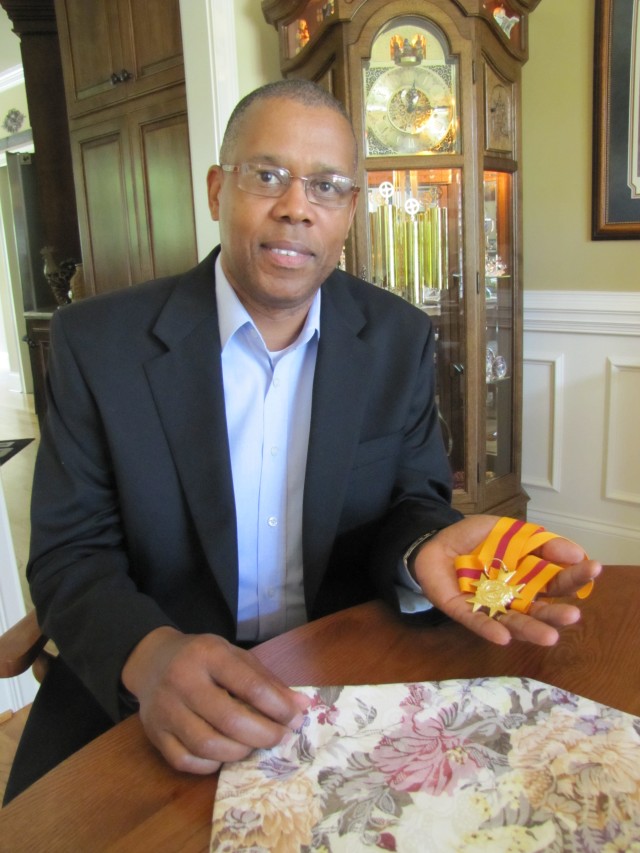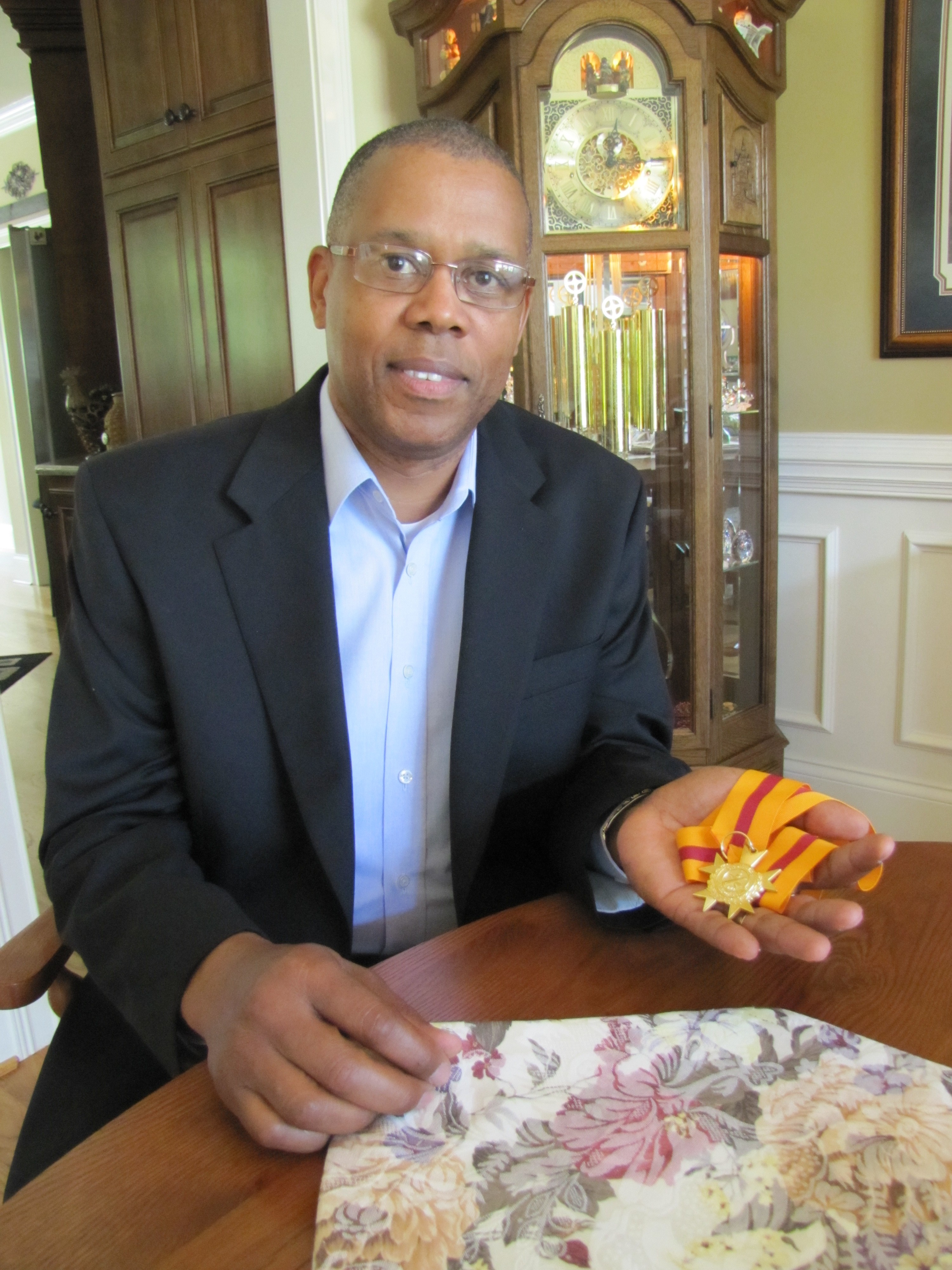
REDSTONE ARSENAL, Ala. -- Although his 40-year Army career didn't bring him to Redstone Arsenal, retired Chief Warrant Officer 5 Harold DeBerry does have something in common with the scientist who brought rocket technology to Huntsville.
Both Dr. Wernher von Braun and DeBerry have been inducted into the Army Ordnance Corps Hall of Fame - von Braun in 1973 and DeBerry this past May.
The induction, recognizing since 1969 those who have made a "positive, significant contribution to the U.S. Army Ordnance Corps," also puts DeBerry in a prestigious and historical group that includes J.M. Browning, the inventor of numerous small arms weaponry; Richard Gatling, the "Father of the Machine Gun;" Dr. R.H. Goddard, the "Father of U.S. Rocketry;" Walter Christie, a pioneer in the development of self-propelled artillery; Staff Sgt. Roy Judkins, the highest decorated explosive ordnance disposal member of the Ordnance Corps; and five Congressional Medal of Honor recipients.
"Twelve of us were inducted this year," said DeBerry of the induction ceremony on May 6 at Fort Lee, Va. "It's a very great honor to be among the historical inductees as well as the contemporary inductees."
Historical nominees for the annual induction ceremony are those whose significant contributions to the corps occurred 50 or more years ago. Contemporary nominees are those who have retired with more than 20 years of service and have a minimum of two years since retirement or are at least 60 years old.
DeBerry, who in 2008 retired and moved to Madison with his wife, combined 14 years as an enlisted Soldier with 26 years as a warrant officer, all in the ordnance field. He saw war duty in Vietnam, Operation Desert Storm/Shield and Operation Iraqi Freedom, and served in several ordnance positions in the U.S. as well as Germany, Hungary, Croatia, Korea and South Vietnam.
During his last assignment, DeBerry was selected to serve as the Ordnance regimental chief warrant officer for the Ordnance Center and Schools at Aberdeen Proving Ground, Md., managing programs affecting the professional development, assignment, recruitment and retention of over 3,000 Ordnance warrant officers. He has coached and mentored warrant officers and senior noncommissioned officers, and served as the senior warrant officer adviser of the chief of Ordnance and as a member of the Senior Warrant Officer Advisory Council, where he served as Ordnance warrant officer to the vice chief of staff for the Army. He is known in the Ordnance Corps as the architect of the warrant officer education system redesign.
A career of assignments growing in responsibility and influence has left DeBerry with an impressive resume.
"I really liked serving in the Army," he said. "I had great leaders and I had exceptional followers. You can't get a job better than that.
"In the course of my career, I had leaders who challenged me to do things I had never considered doing and they gave me the latitude to make decisions, and to lead, follow and execute. It was a career that gave me a sense of achievement and accomplishment."
He hopes to transform that experience into a retirement career that will include working in the community, including as a recently added board member of the Redstone-Huntsville Chapter of the Association of the U.S. Army.
DeBerry volunteered for the Army in 1968. And, by doing so, he ran toward his future instead of running from it.
"I made a conscious decision that rather than be drafted and do what the Army chose for me, I would enlist and do what I wanted to do in the Army," he said. "Most of the guys I graduated high school with went into the Army. My brother had also volunteered. It was a family tradition for us. Our dad served in World War II. I went in thinking I wanted to get that Army thing behind me."
Being raised on a farm in Pulaski, Tenn., the Army presented a physical challenge DeBerry was more than prepared for.
"Compared to what I was doing, coming from where I was coming, the Army was easy. My dad was an agriculture teacher. We planted and harvested a different crop every year and used every inch of land except front and back yards for farming. Growing up, my older brother and I competed at the college level in agricultural competitions and were active with Future Farmers of America. When I got in the Army, I got to sleep two hours later every day than I did on the farm."
His planned "short stint" in the Army soon turned into 13 years in assignments that took DeBerry to Korea, South Vietnam and Germany, and involved jobs of increasing responsibility in the engineering corps - power generator repairman, foreman, section chief and maintenance sergeant. One of those assignments -- in 1971 -- included providing field power for elite communications in Saigon during the Vietnam War.
Those years convinced DeBerry that the Army was not just a step to another career. It became much more than that, as DeBerry pursued a warrant officer commission as an engineer equipment maintenance warrant officer and married a fellow Soldier. DeBerry and his wife, retired Sgt. 1st Class Gloria DeBerry, raised two children whose futures also included military service.
"The way you raise a family is you keep them aware of who you are and what you are committed to, and what role they play in that commitment. When you do that, you end up with a family committed to the same things you are," DeBerry said.
The DeBerrys' son - Brian - served six years as an Army infantryman. Their daughter, Roslyn, served for six years in the Ordnance branch. All four served in Operation Desert Storm in 1990-91.
"We all deployed within a couple of months of each other," DeBerry said. "We pretty well knew what was going to happen. The scary part was that we might not all get to go. None of us wanted to stay back and watch it on CNN, and wonder about the rest of the family.
"Roslyn was assigned to an ammunition unit, Brian was on the front line, and Gloria was the logistician going back and forth between the two. I was assigned to the 2nd Support Command and was responsible for equipment readiness. Brian was with the 3rd Armored Division, and he was the one who was hard to keep track of. His division and their movement were sporadic and fast and based on what was happening on any given day."
Throughout his warrant officer career, DeBerry served as an engineer equipment maintenance warrant officer and senior logistics warrant officer. He has been responsible for organizing an engineer equipment maintenance section, implementing an engineer operator training program, supporting a major upgrade to tank gunnery ranges in Germany and maintaining equipment readiness. In 1997, while assigned to the 317th Maintenance Company, 71st Corps Support Battalion in Germany, DeBerry maintained $6.7 million of Operation Readiness Float equipment recognized as "the best in the U.S. Army Europe" by the V Corps inspector general.
Also, while in Germany with the 7th Corps Support Group, DeBerry supported 160 customers by instituting a maintenance improvement program that reduced the repair backlog by 50 percent and was recognized during the NATO Tactical Evaluation for his contributions to the "best logistics support in 40 years," and his contributions to the overall development of the evaluation's overall logistics concept of support. DeBerry deployed with the 130th Engineer Brigade during the first surge of Operation Iraqi Freedom, where he oversaw an $8.7 million procurement agreement for critical repair parts for engineer equipment.
"We had a very unique mission," DeBerry said of his Operation Iraqi Freedom service. "It was the first time in the Army that engineers were at the forefront of the initial battle. We did so many things to help launch that war. We trained with equipment on the battlefield that we had never had before and we did things that construction and combat engineers have never been asked to do in battle before in terms of preparing the battlefield and making a path for the infantry."
Those jobs included filling holes sabotaged with oil along the infantry route, taking out buildings, creating landing zones, cutting new roads and other activities that created an element of surprise in the execution of battle plans.
In all his responsibilities during his career, DeBerry focused on making sure he always gained a sense of accomplishment from his work.
"My philosophy was do your job and do it right," DeBerry said. "You have to be very diverse in the things you can do. You have to show you have potential for working at different management levels. The Army doesn't promote based on what you've done, but on what your potential is for the future."
Just as he chose the Army, DeBerry also chose the warrant officer program because of the opportunity to shape his own Army career. And, this time, he also planned his career based on longevity.
"Since I was a sergeant, I'd been preparing myself to become an officer," he said. "I was going through the enlisted grades very fast and I knew I wanted to stay in the Army for a long time. I became an E-7 (sergeant first class) well ahead of my peers. I only had two grades left after E-7 and could only stay in the Army for 30 years. As a warrant officer, I was allowed to stay in the Army for 30 years of warrant officer service or until I reached age 62."
Toward that goal, DeBerry obtained his degree from Southern Illinois University in work force education and development with a specialization in curriculum development. His experience and education combined to make DeBerry a good leader, especially on the battlefield.
"As a chief warrant officer with a grade of 3 and above, there is a certain respect and an expectation," he said. "In a war zone, the first thing Soldiers want to do almost immediately is find out who's been in a war zone before and who the leaders are. They watch you, they learn from you and are able to determine your level of competence, confidence and nervousness."
DeBerry and his wife happened to settle in Madison following a fishing trip to Wheeler Lake while he was completing his last assignment at Aberdeen Proving Ground. He hopes to be an active participate in activities associated with AUSA, the local Warrant Officers Association and other military-related organizations.
DeBerry is also willing to talk to Soldiers about the Army's warrant officer program, encouraging them to use it as a way to challenge themselves in a long career. He continues to serve as a coach for the Army's Multi-Source Assessment and Feedback program, which works with Army leaders to enhance leader adaptability and self-awareness, and to identify leader strengths and weaknesses through the use of assessments from subordinates, peers and superiors.
The best warrant officers, DeBerry said, are technically and tactically proficient, and aware of Army standards of excellence and what is required to achieve those standards.
"You have to be very diverse in what you do to be a warrant officer. But you also have to be mentally and physically strong, more so than in the past," he said. "Today, a Soldier has 10 to 12 years of service when they become a warrant officer. But they also have deployed three or four times.
"Striking a balance between the military and family and all those other things that you need - community and religious activities - is needed for this type of career. Striking a balance is about the only thing that would allow today's warrant officer

Social Sharing